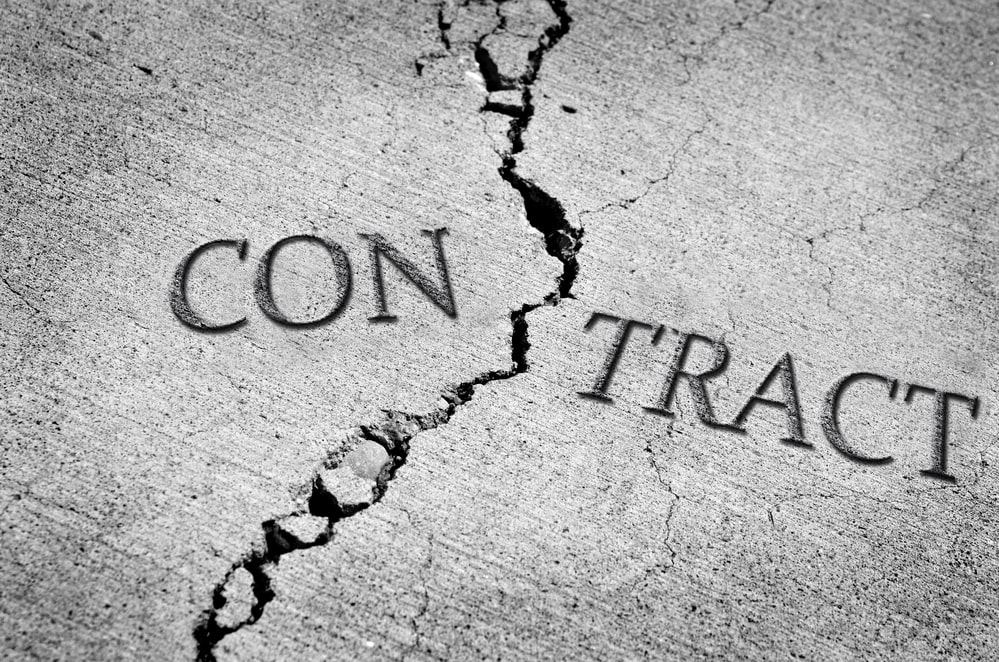Breach of Contract in British Columbia

Contracts form the basis of real estate law in Vancouver as they create a formal, written record of what’s agreed between two (or more) parties.
Most of the time, this process goes smoothly and all parties fulfill their obligations under the contract. However, even when a formal contract lays out the rights and responsibilities of all parties, disputes can and do arise.
If contracts are drafted correctly and considered valid, they are legally enforceable. In the event of disputes, they can often be used to solve matters amicably.
Business contracts are wide-ranging in scope but, with real estate, disputes often arise about contracts of sale, which govern the rules for the acquisition of property in exchange for payment.
Before signing any real estate contract, make sure you understand the consequences of failing to honour the terms of the agreement, which is known as a “breach of contract” in British Columbia.
Here’s what sellers and buyers need to know about real estate contract breaches.
When is a contract considered valid in BC?
Not all contracts that govern real estate transactions are valid. Certain conditions must be met for this to be so. Most notably, these conditions include:
- All parties who sign the contract must do so of their own free will.
- All parties must be of sound mind.
- All parties must intend to create mutual and reciprocal rights and obligations.
- The contract must be reasonably precise.
A contract may be declared invalid by a court if can be shown that:
- Consent was provided by mistake or under duress.
- Fraudulent representation occurred before the signing of the contract.
- One of the parties was found to be of unsound mind.
- The language used in the contract is not reasonably precise.
What happens if a buyer walks away from a contract in BC?
If you’re a buyer of real estate thinking about walking away from a contract in Vancouver, first consider the legal consequences of doing so.
Providing the contract has been executed in a legally valid manner and for a legal purpose, the property seller may be able to claim breach of contract and demand that you pay damages under common law.
Well-drafted real estate contracts may include clauses that define what happens if one of the parties fails to meet his/her responsibilities.
What are the consequences of a breach of contract?
A buyer who fails to uphold the terms of a contract that he/she has signed may be in breach of contract. In such cases, the injured party (the seller) can go to B.C. courts to seek a remedy.
Where a clause exists outlining what happens in the event of a failure to meet one’s obligations, the wording of the agreement usually determines the buyer’s penalty for walking away. This may be a specific sum as financial compensation or another penalty.
If no such clause exists, the seller is usually entitled to “reasonable” monetary compensation for the damages incurred by the buyer’s failure to perform their contractual duties.
Determining “reasonable” compensation is often far from straightforward and may be disputed. The courts may need to intervene and a judge will settle the dispute.
For instance, if a buyer walks away from a contract to purchase a house for $400,000 and the seller must sell it for a lower price (say $375,000), the seller may sue for damages. The buyer may be liable for the $25,000 difference PLUS any other indirect costs incurred by the seller as a consequence of walking away.
What is a fundamental breach of contract?
A “fundamental breach” goes to the root of the contract. This means that it deprives the injured party of substantially the whole mutually intended benefit of the agreement.
A fundamental breach of contract may occur if a real estate buyer walks away from a property deal because this action deprives the seller of the entire “mutually intended benefit” of the agreement.
If there has been a fundamental breach of contract, the injured party may ask the B.C. courts for an order that compels the buyer to perform his/her obligations under the contract (this is termed a “specific performance” remedy).
This is usually only applicable in cases where financial compensation is inadequate because of the unusual nature of the subject matter of the contract, e.g., a unique property or piece of land.
Suing a buyer for breach of contract
If an acceptable agreement cannot be found out of court and/or no provision was made in the contract for breaching the terms, another option for a seller of real estate is to sue the buyer.
Before filing a lawsuit, speak to a qualified real estate lawyer to understand your legal rights and obligations and to make an informed decision about your legal situation.
Real estate litigation is complex and the type of contract and nature of the contractual breach is fundamental to securing a beneficial outcome.
Whether you decide to rescind the contract and seek damages, seek an order for specific performance or pursue another remedy, discuss your situation with an experienced real estate lawyer first.
What are “frustrated” contracts?
A “frustrated contract” is one where a specific unforeseen event makes a contract impossible to complete. This effectively makes changes to the nature, meaning, purpose, effect and consequences of the contract, rendering it unenforceable. Both parties end up having to walk away from the agreement.
With frustrated contracts, the event that causes the contract to become “frustrated” must have occurred after the contract was completed and cannot be self-induced. It must also render the contract totally different from what the parties intended when they formed the contract.
However, a buyer can’t simply claim “frustration” and walk away from a contract. There is a high standard to meet with such claims and considerable evidence will be required if it is challenged by the seller.
A good example of a frustrated contract in real estate might be an unanticipated circumstance like a fire or storm that destroys a property after the contract has already been signed.
Are new government rules and taxes valid reasons for a frustrated contract?
Some parties in real estate disputes claim frustration (rather than a breach) when new and unexpected rules and taxes are announced by the government.
If you’re facing this situation, speak to an experienced real estate lawyer for advice before proceeding as there are no hard and fast rules with this,
For instance, say the council changes the maximum allowable square footage for a building after a contract has already been signed. This may mean that continuing the agreement would break the law and, therefore, frustrate the contract.
However, tax issues are generally much more difficult to use as a reason for contract frustration and B.C. judges are unlikely to be sympathetic if you go down this path.
Can you apply a forfeited deposit against damages?
If the property buyer is in breach of contract and has already paid a deposit, the seller is usually entitled to keep the deposit even if no financial losses have been incurred by the seller.
Effectively, the deposit is forfeited by the buyer because a deposit is not usually only provided as part payment but also as a security to incentivize the completion of the transaction.
However, according to B.C. case law, if a seller does suffer losses from a buyer walking away (in breach of contract), the seller is usually entitled to recover the losses less the amount of the deposit.
If you need help assessing a real estate contract before signing it or during a dispute, contact a Castle Law LLP real estate lawyer as soon as possible.
We can advise you of your options during a confidential 30-minute telephone or video consultation. Call now at 778-331-1171 to arrange.

